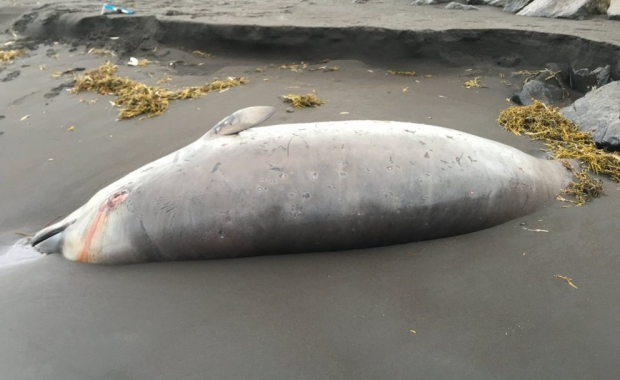We have seen a unusually large number of reports of beached bottlenose whales and other deep ocean whales this summer. Scientists have been unable to determine the cause of these deaths. Marine biologists in Norway have also noticed an unusually high number of beached deep ocean whales this summer.
Read more: What's going on with the whales? Yet another bottlenose whale found beached
On September 21 the North-West Iceland Natural History Museum NNV received the fifth report of a beached bottlenose whale in Skagafjörður fjord this summer. The whale was found dead on Borgarsandur beach near the town of Sauðarkrókur. The 3.8 m long animal was removed from the beach before it started to rot, as the beach is a popular recreational area for locals.
Bjarni Jónsson, a biologist at NNV who has investigated the whales that have washed ashore in Skagafjörður told the National Broadcasting Service earlier this year that it is possible the whales, which usually hunt in the deep oceans, are moving closer to shore to chase schools of fish. Others have suggested that NATO military sonar exercises in the North Atlantic might be causing the unusually high number of beached deep ocean whales.
We have seen a unusually large number of reports of beached bottlenose whales and other deep ocean whales this summer. Scientists have been unable to determine the cause of these deaths. Marine biologists in Norway have also noticed an unusually high number of beached deep ocean whales this summer.
Read more: What's going on with the whales? Yet another bottlenose whale found beached
On September 21 the North-West Iceland Natural History Museum NNV received the fifth report of a beached bottlenose whale in Skagafjörður fjord this summer. The whale was found dead on Borgarsandur beach near the town of Sauðarkrókur. The 3.8 m long animal was removed from the beach before it started to rot, as the beach is a popular recreational area for locals.
Bjarni Jónsson, a biologist at NNV who has investigated the whales that have washed ashore in Skagafjörður told the National Broadcasting Service earlier this year that it is possible the whales, which usually hunt in the deep oceans, are moving closer to shore to chase schools of fish. Others have suggested that NATO military sonar exercises in the North Atlantic might be causing the unusually high number of beached deep ocean whales.







